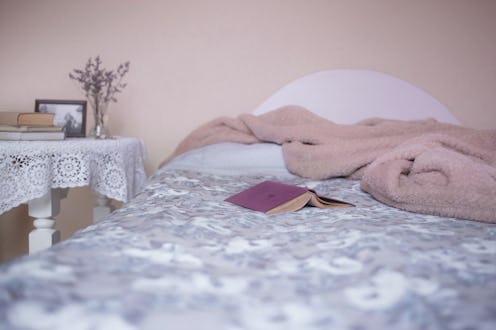
Is there a fate worse than not being able to fall asleep? I think not. Having tips to help you fall asleep during a restless night can feel like a serious life-saver, and that's because it kind of is. When you go without sleep, it has a serious impact not only on the next day, but on your long-term health. Not getting enough sleep can cause issues with your memory, concentration, motor skills, and your mood; additionally, studies show that if you don't get enough sleep for an extended amount of time, you are at a higher risk of diabetes, hypertension, heart attacks, and strokes. Still, between balancing our jobs, relationships, friendships, families, and alone time, a lot of us find ourselves so wired that when we finally lie down, we can't fall asleep. It's the worst.
But sometimes, the best source for new tricks to try can be simply other people. According to a recent thread in AskReddit, Redditors have a number of creative and practical ways to help themselves fall asleep. The thread, which asks, "What do you do to make yourself fall asleep during a restless night?" has been up less than a day, and already has more than 600 useful responses in the comments.
I've broken down some of the top suggestions below, but be sure to check out the full thread over at AskReddit, too!
1. Be OK With Not Falling Asleep
While this sounds a little counter-intuitive, recent studies suggest that being OK with not falling asleep might actually be key to falling asleep. The logic here is that if you have yourself worked up about not being able to fall asleep, you'll have a harder time relaxing and letting go of those thoughts enough to actually fall into a slumber. Embracing that sleep will come when it comes, however, may just calm you enough to actually fall asleep.
2. Sleep On The Other Side Of The Bed
Sometimes turning to the opposite end of your bed can make a world of difference. Maybe it's because the bed there feels cooler and more refreshing, or maybe your brain just needs a change of pace. Either way, this is a quick and easy fix on nights you can't stop tossing and turning.
3. Get Geographical In Your Brain
Imagining landscapes can be a great way to focus your mind without thinking about numbers or counting sheep. Focusing in on a landscape where you can work yourself through a number of details can help distract you from other stressors that might be otherwise keeping you awake.
4. Find Your Perfect Background Noise
Research shows that many people find it helpful to listen to background noise while they sleep, such as white noise or pink noise. The idea here is that background noises can create a blanket noise which blocks out all other random noises we tend to hear at night, like our pets wandering into our room, our significant others getting up for water, and so on. For some people, this can be as simple as turning on an air conditioner or a fan, while for others, audio tapes of nature sounds or music do the trick. You might also try this eight-hour video of an Irish waterfall, which went viral last year for its ability to soothe people to sleep.
5. Consider Using Sleeping Aids
As Laura Newcomer pointed out over at Greatist, sometimes using a natural supplement, such as Melatonin, is a great way to help yourself fall asleep at night. As always, it's important to talk to a medical professional before taking any kind of medication, natural or not.
6. Focus On Your Breathing
Shana Lebowitz explained in a different Greatist post a number of ways you can focus on your breathing to help you relax. The logic here is that the more relaxed you are, the easier time you will have falling asleep. Some people focus on their breathing by counting their breaths, while others find it useful to really tune into your physical state and evaluate your breaths: Are they shallow? How long are you breathing in? Doing so can bring you both a greater sense of awareness of yourself as well as calm your mind and body.
7. Give Yourself An Acronym To Practice
If you're able to identify what, specifically, keeps you up at night, it can be really helpful to make a "sleep plan" before you go to bed. It requires doing some self-exploration: Are you never comfortable physically? Are you stressed about something at work? Are you ravenous for a snack? Whatever it is, figuring out either how to deal with it, or how to let it escape your mind, can make a world of difference in falling asleep.
This Redditor, for example, made up an acronym to remind themselves how to relax when in bed. Figuring out what works for you and making it easy to remember might go a long way towards helping you sleep.
8. Switch Up The Room Where You Sleep
The National Sleep Foundation suggests going into a room aside from your bedroom and doing else something until you feel tired, then returning to bed to try and sleep. The rationale behind this is that if you keep your bed for sleep only, you'll have an easier time winding down mentally and falling asleep.
9. Find Your Favorite Relaxation Videos To Stream
Thanks to the internet, we have an almost endless array of different resources available to us for helping us get to sleep. If you're someone who likes to listen to relaxing music while you sleep, there are a ton of super long videos and audio available for you to stream on YouTube, for example; you could even try some ASMR videos. There are also many organizations, such as your local library, that often allow you to stream audio for free. This means you have a ton of podcasts available to you as well.
Sweet dreams, everybody!
Images: Freestocks.org/Pexels